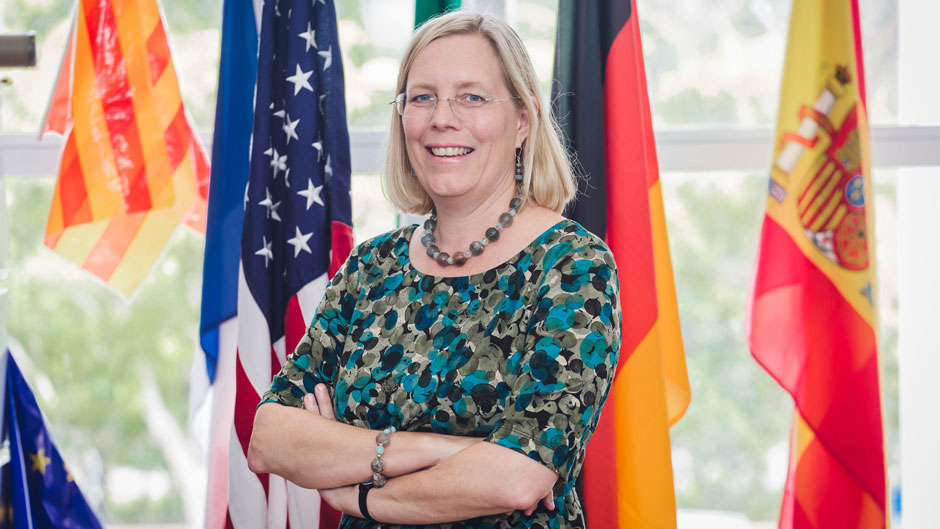Louise Davidson-Schmich, political science professor in the University of Miami College of Arts and Sciences, recently received a grant from the German government as part of their “Deutschlandjahr” (Germany Year) initiative to promote a positive German/American friendship.
As part of the grant, over the next couple of months, the University of Miami and Florida International University will host a series of roundtable and networking sessions on Germany, the United States, and the challenges of the 21st century.
Each roundtable event will feature UM and FIU faculty, as well as local experts speaking on topics that include immigration, gender and sexuality, climate change, developing a competitive workforce, and increasing polarization in politics.
News@TheU spoke with Davidson-Schmich about the roundtable events and the importance of the conference. For more information about the roundtable discussions, visit the website here.
The roundtable and networking series is a collaboration between UM and FIU. How did that partnership happen?
Between UM and FIU, there a remarkable number of top-notch scholars working on issues relevant to Germany, the European Union, and the U.S. The goal of the program is to reach out to people in the community and let them know about the issues Germany and the U.S. have in common, and by combining forces we can disseminate our expertise more widely. My FIU co-organizer, associate professor of politics and international relations, and director of the Miami-Florida Jean Monnet Center of Excellence, Markus Thiel, is no stranger to UM. He earned his Ph.D. from the International Studies program in 2005; I was a member of his dissertation committee.
The roundtable discussions focus on many topics, from climate change to gender and sexuality. The first roundtable event—held here at UM on Oct. 18—is about immigration in the U.S. and Germany. Why focus a roundtable on this topic?
All roundtables in the series are designed to highlight common issues that both countries are facing and to consider how each side can learn from the other. Historically, the two countries have had very different immigration and citizenship policies. While the United States’ population is quite diverse and has migrated here from a wide variety of countries, Germany has historically been more homogeneous and is actually a country of emigration—a place people left rather than migrated to. The U.S. has had a jus soli immigration policy (people who are born here obtain citizenship) while Germany long pursued a jus sanguinis policy (granting citizenship only to the children of citizens). In recent decades, however, Germany has become more like the U.S., reforming its citizenship laws and experiencing an influx of immigrants and refugees from a wide range of countries. Today, both countries are grappling with how to best incorporate new arrivals into the fabric of society against a tide of rising anti-immigrant sentiment among some parts of the native population. The roundtable will focus on these challenges and compare Berlin and Washington’s policy responses.
Considering the current political atmosphere in Germany and U.S., how would you describe the international relationship between these two countries?
Since the end of World War II, Germany and the U.S. have been close allies working together to build economic prosperity, promote democracy, and ensure peaceful relations not only with each other but across western Europe as a whole. This transatlantic relationship has been vital to Germany’s national security, and the Federal Republic has been a loyal ally to the U.S. Both countries sought to contain communism and celebrated together as the Berlin Wall fell and communism came to an end in East Germany. The two countries’ economies are also tightly intertwined. The German American Chamber of Commerce reports that 250 German firms have invested $4 billion in Florida alone and employ over 20,000 people in our state. Given these circumstances, many Germans and Americans are strongly in favor of continued good relations; indeed, the “Deutschlandjahr” program was conceived by the German Foreign Office as a way to help preserve these transatlantic ties of friendship.
Who is this roundtable and networking series for, and what do you hope to accomplish?
Anyone interested in learning more about the issues that Germany and the U.S. have in common is welcome: students, faculty, staff, and interested community members. Each event is free and open to the public. Dr. Thiel and I are reaching out, not only to people on our campuses but also to community members including a number of German-American groups such as students in local high school German classes and the German American Business Chamber. Depending on the topic of the roundtable, we are also hoping to attract practitioners in a given area. For example, we are welcoming members of Miami’s Refugee Assistance Alliance organization to the immigration roundtable. The networking receptions following each roundtable will feature German food and drink and music by German composers such as Beethoven played by Frost School of Music students.
International engagement and connecting to institutions and individuals in the Americas and around the world is part of UM’s aspiration to be the Hemispheric University. Do you think these roundtable sessions help position UM as such?
Absolutely. One of the reasons our “Deutschlandjahr” grant proposal was successful was because we were able to make the case that by teaching people about U.S./German issues here in Miami, we would actually be reaching out to a community with ties far beyond this immediate area. As a global city, Miami is facing many of the challenges we will be discussing in our series: increasing immigration, rising sea levels, the need to be economically competitive, and political polarization. UM has faculty expertise to help understand how we can learn from other countries and address these challenges, and how others can learn from us.

